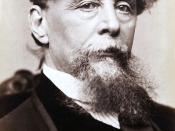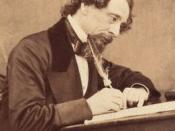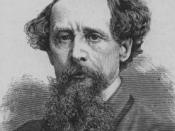Superficially, these three characters are all very different. They have different social status, different behavioural characteristics and ultimately different destinies. However they also share a number of attributes. They are all three intrinsically selfish, materialistic and lack any social conscience. They each become a target of Dickens' fierce criticism, because they represent elements of Victorian culture which he despised.
Bitzer, Tom Gradgrind and James Harthouse are all deeply unfeeling characters, with whom the reader cannot sympathise. Despite coming from very different backgrounds they all adopt similarly uncaring attitudes. Throughout the novel James Harthouse is referred to as 'the devil' and Tom Gradgrind as 'the whelp'. Obvious parallels between the derogatory nature of these comments could point towards an attack on the wealthy in general. However this would be an inaccurate interpretation of the text. 'Hard Times' is not an attack on the privileged, but on those who use their advantages selfishly.
This is well demonstrated through Dickens' unsympathetic portrayal of Bitzer, who attracts no more compassion from the reader than his wealthier counterparts.
All three characters are used to further the theme of utilitarianism. Bitzer and Tom are models of Gradgrind's school of 'fact'. Both characters were taught from an early age to be self-interested and pragmatic, which is exactly what they have become. Harthouse on the other hand only encounters utilitarianism when he meets Gradgrind. By this stage in his life he has become completely indifferent to anything beyond his immediate gratification, and simply doesn't care enough to express an opinion either way. Dickens' unfavourable representation of Harthouse shows his disgust at this attitude. It seems that in Dickens' view, even toleration of utilitarianism is unacceptable, particularly for Harthouse, as he is in a position of some knowledge and influence. In order for a character to earn Dickens' praise,


